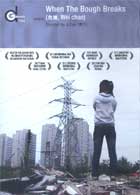
When the Bough Breaks 2012
Distributed by Icarus Films, 32 Court St., 21st Floor, Brooklyn, NY 11201; 800-876-1710
Producer n/a
Directed by Ji Dan
DVD, color, 144 min.
Jr. High - General Adult
Child Abuse, Family Relations, Poverty, China
Date Entered: 12/06/2013
Reviewed by Tom Ipri, Drexel UniversityJi Dan’s documentary, When the Bough Breaks, is ostensibly about the struggles of the young daughter of a poor migrant family struggling to find a way to pay for her brother to go to school. But the heart of the film is the dysfunctional relationship between the children and their parents that delivers a sense of hopelessness for the daughter’s task. The advertising blurb for the film describes the parents as “troubled and eccentric” when “awful and abusive” is much truer to the film.
When the Bough Breaks is frustratingly unclear about the family’s situation. They are obviously poor, living in nothing more than shacks near a garbage dump. The children appear to live apart from their parents, although no explanation is given as to why. An eldest daughter had gone off to find work a few years prior but subsequently disappeared. Two other daughters, Xia and Ling, remain along with a son, Gang. All appear to be in their early teens.
What is also frustratingly unclear is their school situation. The local school the children had been going to has closed and the other options are expensive. But why the options are so limited is never explained. Xia takes it upon herself to try and raise the money to send Gang to school. That Xia lives in a culture where she would not consider this option for herself is just one in a long list of depressing things about her life. Gang remains passive throughout with the exception of one scene where he admits that she is putting too much pressure on him.
Their parents have no interest in their schooling. The mother remains distant and the father is an abusive alcoholic. Sadly, Xia reflects her father’s abusive nature often lashing out at her indifferent brother and genial sister.
Dan takes a very hands-off approach to her filmmaking. Her camera remains objective, allowing the scenes to slowly reveal themselves. Her camera lingers as the family members go about their mundane tasks. And this is the main problem with the film. Although there is some benefit to seeing how the family lives, these long scenes strip the film of its inherent drama. Given the content, When the Bough Breaks is seriously overlong at 144 minutes. The film feels more like raw footage that still needs to be edited.